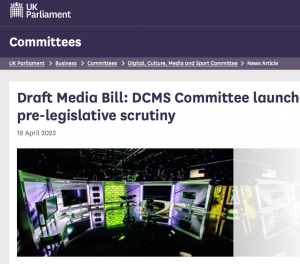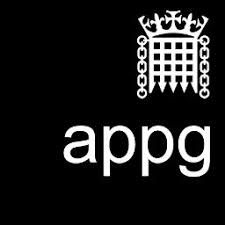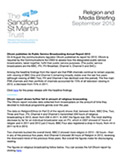Briefings
Our regular briefings – keep up to date with our regular briefings, including facts and figures about religious broadcasting from a range of sources. If you wish to be notified when this page is updated, please get in touch.
Submission to Ofcom consultation on changes to the performance measurement framework (PMF) used to assess the BBC – June 2023
In April 2017 the BBC underwent a fundamental reform to its governance. Previously the BBC had been self-regulating but the Clementi report – which was published the year before and formed part of the government’s review of the BBC’s royal charter – supported the government’s assertion that it was the failure of governance – and of the BBC Trust – which had resulted in some of the BBC’s worse mistakes – including the Jimmy Saville scandal, high presenter salaries and the gender pay gap.
Thus it was that regulatory oversight of the BBC passed wholly to the media regulator Ofcom which is the regulator for all UK communications – broadband, phone services and the post – as well as the UK’s broadcast media. It’s a big job and with the growth of subscription video on demand and digital platforms, Ofcom’s remit is continuing to expand.
In spring 2023 Ofcom launched a public consultation on proposed changes to the performance measurement framework (PMF) they use to assess the BBC’s performance in delivering its Mission and promoting its Public Purposes.
While the Sandford St Martin Trust welcomes moves to expand the scope of Ofcom’s approach to monitor the BBC’s performance across new platforms, we do not believe the proposed PMF is rigorous enough to guard against the decline of core public service genres such as religious broadcasting.

Response to DCMS Committee pre-legislative scrutiny of the draft Media Bill – May 2023
On 29 March, the Department for Culture Media and Sport took significant steps in making good the Government’s intention to update the 2003 Communications Act when it published a draft Media Bill.
As a replacement for the 2003 Communications Act, the draft is not before time. Much has changed in the world of broadcast technology in the twenty years that have passed since such an exercise was last undertaken and the draft covers a lot of ground. But does the draft do what it needs to do to protect core public service genres such as religious and ethical programming?
The Sandford St Martin Trust most emphatically does not believe it does.
You can read our submission to the DCMS here.
You can read our press statement here. Or read the blog based on our contribution to a recent VLV panel discussion on the subject.

Response to Government proposals to remove Channel 4’s publisher-broadcaster restriction – April 12 2023
In January 2023, the government formally abandoned plans to privatise Channel 4. While by explanation the Department of Culture Media and Sport (DCMS) cited the findings of their business case review, there’s no doubt that more than two years of organised and vocal opposition from across the industry and civil society had an impact on the result. (You can read more about our campaign and submissions to the House of Lords and the DCMS below.)
Now, however, the government has announced a package of “measures to support (Channel 4’s) sustainability in the long term” which will include reform of the so-called “publisher-broadcaster” model which prevents Channel 4 from making or owning content.
The Sandford St Martin Trust was invited by the DCMS to respond to these proposals. Like many of the UK’s television production companies, we are concerned these plans still risk undermining the independent production sector and, we believe will have a negative impact on the quantity and quality of religious and ethical content available.
This is the basis of our further submission to the DCMS which you can read here.
After more than forty years of the Sandford St Martin Awards, we recognise the huge contribution the UK’s indie production companies have made to the genre. Together they are responsible for making some of the best religious and ethical content available. Have a look at our winners and finalists and see for yourself.
Ofcom Consultation: Modernising the BBC’s Operating Licence – September 14 2022
These are interesting times for the UK’s public service broadcasters. We’ve a newly appointed culture, media and sport secretary (the 11th consecutive conservative minister in this post in the last 12 years) who has – so far – been much quieter than her predecessor about her vision for the futures of Channel 4 and the BBC.
Insiders say one shouldn’t expect any sort of political volte-face. The Queen’s Speech last May laid the ground for a Media Bill that will enable the sale of Channel 4 and midway through the BBC’s current Charter period the BBC’s licence fee has been frozen amid soaring inflation.
It’s against this background that Ofcom has been reviewing the BBC’s performance and how it should be regulated in the future. Part of this is a consultation on the BBC’s Operating Licence which essentially sets out what and how the broadcaster delivers. The BBC has been lobbying for more flexibility with regard both and these obligations are at the heart of the current Ofcom consultation on Modernising the Operating Licence.
There’s no doubt the Licence needs to be modernised. Broadcast technology and the media landscape have changed dramatically over the last decade as how audiences now access content. The proposed changes indubitably would give the BBC more flexibility to respond to its current financially-challenged circumstances. But the Sandford St Martin Trust is concerned that it does so at the cost of providing adequate protection for core public service content like religious and ethical content, children’s or arts programming.
The BBC has already announced plans to move CBBC entirely online. Jane Martinson writing in the Guardian eloquently raises the question of how such a move would have impacted audiences had it occurred pre-lockdown and asks what it says about the BBC’s future. The same questions need to be asked about religious and ethical content which, reading the runes, it seems evident will also be largely moved to online platforms.
The BBC is not now and has never been perfect but particularly in this centenary year, it’s impossible to ignore the contribution it has made to the purpose of reflecting, representing and serving the UK’s diverse communities – including its religious communities and children. At the Sandford St Martin Trust we wonder if BBC is successful in achieving the removal of those demands on how it operates that many people see as justification for the licence fee, what happens next?
You can read our submission to Ofcom’s consultation on Modernising the BBC’s Operating Licence here.

Department of Culture, Media and Sport:
Consultation on a change of ownership of Channel 4 Television Corporation – 14 September 2021.
In July 2021 the government published a document that strongly argued the case for the selling off of Channel 4 – the UK’s self-funded publicly owned broadcaster – and invited public and interested parties to respond. This is not the first time the government has made the argument that Channel 4 should be privatised. The most recent attempt – also overseen by culture minister John Whittingdale – was as recent as 2016. You can read the Trust’s submission to that consultation below.
It’s debatable how much has changed since then but the government has argued that Channel 4 is in urgent need of outside investment and changes to its remit if its to compete with Netflix, Amazon or any of the other international streaming companies offering video on demand. Channel 4 itself has repeatedly insisted it does not need external funding to secure its future and has earned that a for-profit owner would likely cut its investment in public service orientated, original British programming.
At the Sandford St Martin Trust, we are concerned with how the privatisation of Channel 4 would impact the quality and quantity of religious and ethical content available to UK audiences. This was the subject of our What 4? online media salon which you can watch here.
What was said then as well as our own research has informed our submission to the DCMS which you can read here.
For more information about the scope of the consultation visit the the DCMS’s own consultation page.
UPDATE: April 2022
On 28 April, the Department for Culture, Media and Sport published their white paper detailing their response to submissions to their consultation on a potential change of ownership of Channel 4 Television Corporation which you can read in full here.
Or you can read the summary press release which they titled: “Broadcasting reforms to create new golden age of British TV and help nation’s public service broadcasters thrive” in which it says: “the Government (will) pursue a change of ownership of Channel 4 to give it the tools it needs to succeed in the future as a public service broadcaster while protecting its distinctiveness”.
The DCMS reports it received 56,293 responses to its consultation. The consultation never directly asked if respondents support or oppose privatisation. Instead the question it posed was: Do you agree that there are challenges in the current TV broadcasting market that present barriers to a sustainable Channel 4 in public ownership?
In response to this question more than 96% of those who replied said “no”. Only 2% of respondents agreed with the DCMS’s contention that Channel 4 is unsustainable in public ownership.
You can read the Research Briefing prepared for the Library at the House of Commons here.

House of Lords, Communications & Digital Select Committee:
Call for Evidence on The Future of Channel 4 – 17 September 2021.
In response to the DCMS’s proposals for a change of ownership at Channel 4, the House of Lords opened its own process asking interested parties to address a separate list of questions and to submit evidence on how the government’s proposals would impact audience experience and the future of the UK’s creative industry.
Our submission to that inqury is here.
For more information about the House of Lords’ consultation, visit their website or read the final report here.

Ofcom: Small Screen: Big Debate: The Future of Public Service Media – March 2021
Ofcom’s review sets out to examine how public service broadcasting (PSB) can be strengthened and maintained for the next decade and beyond, “in the face of unprecedented changes to technology, financing and viewer behaviour”.
The Trust’s response puts the emphasis on what has been a long decline in religious and ethical content provided by public service broadcasters.
It’s understood that against the background of a global pandemic, increasing funding-pressure and the rise of global streaming services, traditional PSB is at a crossroads. All the more reason, we feel, that core PSB content (news, arts/culture, children’s and religious and ethical content) is properly defined and safeguarded before broadcasters accelerate their transformation for the digital age.
You can read our written submission to Ofcom here.
For more information about the scope of the consultation visit the Ofcom’s webpage here.

APPG on Religion in the Media: Inquiry into religious literacy in print and broadcast media – Spring 2020.
The All Party Group (APPG) on Religion in the Media was formed to explore how religious literacy in media and politics can be improved, and to provide a platform where the regulatory, commercial and cultural factors which influence depictions of faith can be discussed. In spring 2020 the APPG launched an inquiry into religious literacy in print and broadcast media with a call for written evidence. This was followed by invitations to representatives from some organisations to also give verbal evidence to the group. SSMT’s Chair and Executive Director participated in these live sessions.
You can read the Trust’s written submission to the APPG here.
And the APPG’s final report “Learning to Listen”, published on 14 April 2021 can be found here.

DCMS open consultation on decriminalisation of the TV licence fee – April 2020.
In January 2020, not long after the General Election, Boris Johnson’s government launched its first strike on BBC funding, opening a formal process to review lifting criminal penalties associated with non-payment of the licence fee.
This is the second time the government has reviewed the licence fee in less than five years and, as many commentators have pointed out, comes at a time when the BBC is still trying to manage the budget cuts imposed under the last Charter Review. Now BBC executives have been quoted as saying that if criminal sanctions are removed, the corporation’s ability to collect the fee will be badly weakened and increasing evasion could “(blow) a hole in the broadcaster’s programming budget of £200m or more.”
At the Sandford St Martin Trust we are particularly concerned about how this would impact on the quality and quantity of religious and ethical content being made and broadcast by the corporation. While it may be considered “core public service territory”, broadcasting in this genre (like arts, news and Children’s programming) is not hugely commercial – as evidenced by the massive decrease in content of this type being made in the mainstream over the last decade. By contrast, the BBC is the only public service broadcaster that has maintained a reasonably steady output over the same period.
You can read our submission to the DCMS’s open consultation here.
More details about the consultation can be found on the DCMS website here.

Ofcom’s Children’s Content Review – 31 January 2018.
Figures released by Ofcom in 2016 revealed the deep jeopardy facing children’s programming in the UK. The amount of original programming for kids made by UK broadcasters was at its lowest level since 1998 with children’s contents made by commercial broadcasters down 93% since the early 2000s.
Echoing the concerns of educators, parents and young audiences, Ofcom has committed to building a “comprehensive view” of the current quantity, range and quality of children’s content in the UK – as well as the impact of changing industry and audience dynamics. As the manner in which audiences – including audiences of young people – access broadcast content evolves, how must provision evolve to match demands for quality, quantity and accessibility?
The Children’s Content Review which accepted submissions between November 2017 and the end of January 2018 was designed to help Ofcom assess if and how it might use the power provided in the recent Digital Economy Act 2017, which could see it impose children’s content quotas on ITV, Channel 4 and Channel 5.
At the Sandford St Martin Trust, we believe young audiences deserve excellent broadcasting that explores religion, ethics or morality.
You can read our submission to Ofcom’s review here.
More details about other submissions and Ofcom’s review are here.

Holding the BBC to account for the delivery of its mission and public purposes”: our submission to Ofcom’s consultation – 17 July 2017.
Under the new Royal Charter and Agreement, regulation of the BBC passed from the BBC Trust to Ofcom on 3 April 2017. One of Ofcom’s central responsibilities is to hold the BBC to account for fulfilling its mission and promoting its public purposes.
As part of its new responsibilities, Ofcom is required to publish an operating framework containing provisions to secure effective regulation of the BBC. In relation to the BBC’s performance, it must set an operating licence for the BBC, and it may set measures to assess the BBC’s performance. The licence must set out the enforceable regulatory conditions that we consider appropriate to ensure the BBC fulfils its duties.
In its submission to Ofcom, the Sandford St Martin Trust welcomes Ofcom’s recognition of religious programming as “core public service broadcasting territory” but urges that the BBC should provide the public with a working definition of what it considers “religious programming” and a strategy that will clearly set out how its broadcast offering will reflect the diversity of faith and belief across the UK and the world, and, the role of faith in the 21st century.

“The Sustainability of Channel 4”: our submission to the House of Lords Communications Committee inquiry – 20 April 2016.
How would privatisation affect Channel 4’s remit and its religious programming? In September last year, a Government official was photographed carrying a document which has led to speculation that the Government is preparing to privatise the Channel 4 Corporation. David Abraham, C4’s Chief Executive has repeatedly warned that privatisation would not just threaten the channel’s current remit but would also damage news, current affairs and documentary output as these genres are less commercially viable. In our submission to the inquiry, we argue why religious broadcasting and a commitment to promoting religious literacy should be key parts of Channel 4’s future.
Read our submission to the House of Lords Communications Committee here.

The Sandford St Martin Trust’s submission to “A Future for Public Service Television” Inquiry – 31 March 2016.
The Future of TV Inquiry (aka the Puttnam Inquiry) was set up to consider the nature, purpose and place of public service television today and for the future. It aims to address how public service content can be most effectively nurtured taking into consideration a range of services, platforms and funding models. Taking its cue from the Pilkington Inquiry in 1962 that combined a searing analysis of TV’s public purposes with specific recommendations about how to embed these purposes inside particular channels and institutions, the Inquiry has aimed to examine how best to secure quality content that informs and inspires, entertains and educates, connects and challenges audiences in the 21st century.
Read the Trust’s submission here.
Read more about A Future for Public Service Television here.

Sandford St Martin Religious and Media Briefing – November 2015
The Trust’s response to the BBC Charter review Consultation: Tomorrow’s BBC – Creating an open, more distinctive BBC.

Sandford St Martin Religious and Media Briefing – June 2015
The results of the Sandford St Martin Trust’s first online poll on Religious, Ethical and Spiritual Broadcasting (May 2015) are published in full.
» Download the poll results or read our blog.

Sandford St Martin Religious and Media Briefing – February 2015
This issue comprises of the Trust’s submission to Ofcom’s Third Public Service Broadcasting (PSB) Review Consultation made on 26 February 2015.
» Download the February briefing (PDF, 550kb)

Sandford St Martin Religious and Media Briefing – September 2014
This issue includes information on BBC’s latest Annual Report amongst the normal programme news and reviews.
» Download the September briefing (PDF, 110kb)

Sandford St Martin Religious and Media Briefing – April 2014
This issue includes news about Ofcom’s new PSB review, details of a new resource for followers of media policy debates, and remembers Jocelyn Hay CBE, founder and President of the Voice of the Listener and Viewer (VLV), who died in January.
» Download the April briefing (PDF, 110kb)

Sandford St Martin Religious and Media Briefing – December 2013
This issue includes new DG Tony Hall’s vision for BBC’s future, the importance of religious literacy and a round-up of other key news in religious broadcasting.
» Download the December briefing (PDF, 110kb)

Sandford St Martin Religious and Media Briefing – September 2013
This issue includes Ofcom’s Public Service Broadcasting Annual Report 2012, falls in religious broadcasting, and results from the British Social Attitudes Survey.
» Download the September briefing (PDF, 120kb)


